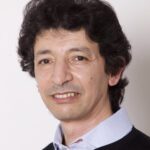Lien vers Pubmed [PMID] – 10025409
Lien vers HAL – pasteur-04036401
Lien DOI – 10.1016/s0092-8674(00)80556-5
Cell, 1999, 96 (3), pp.437-446. ⟨10.1016/s0092-8674(00)80556-5⟩
Potassium channels regulate electrical signaling and the ionic composition of biological fluids. Mutations in the three known genes of the KCNQ branch of the K channel gene family underlie inherited cardiac ar-rhythmias (in some cases associated with deafness) and neonatal epilepsy. We have now cloned KCNQ4, a novel member of this branch. It maps to the DFNA2 locus for a form of nonsyndromic dominant deafness. In the cochlea, it is expressed in sensory outer hair cells. A mutation in this gene in a DFNA2 pedigree changes a residue in the KCNQ4 pore region. It abol-ishes the potassium currents of wild-type KCNQ4 on which it exerts a strong dominant-negative effect. Whereas mutations in KCNQ1 cause deafness by af-fecting endolymph secretion, the mechanism leading to KCNQ4-related hearing loss is intrinsic to outer hair cells.

